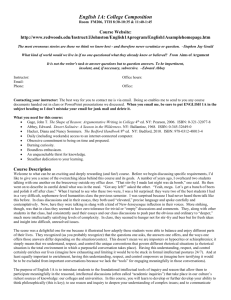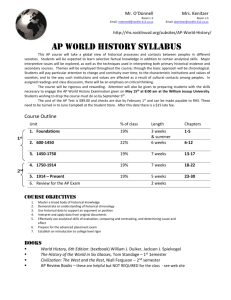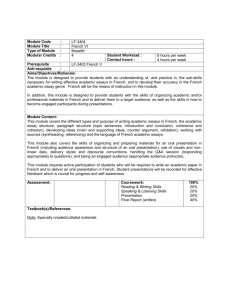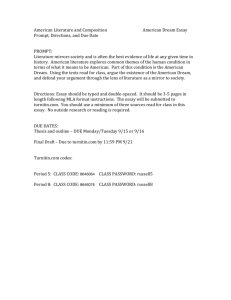English 17 - College of the Redwoods
advertisement
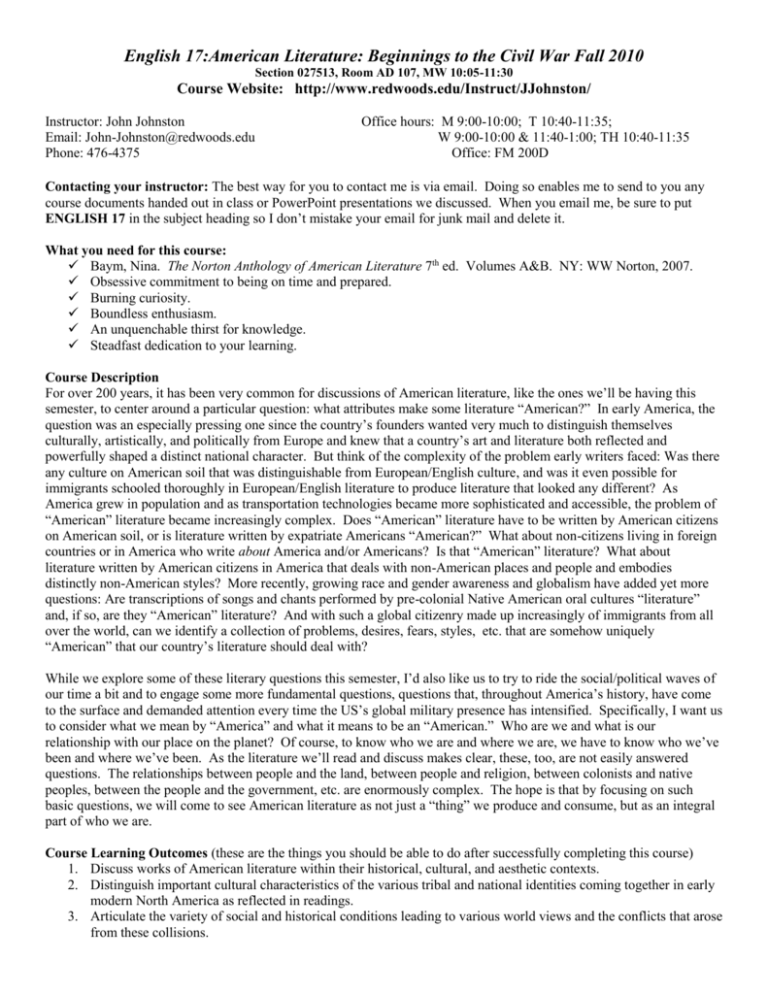
English 17:American Literature: Beginnings to the Civil War Fall 2010 Section 027513, Room AD 107, MW 10:05-11:30 Course Website: http://www.redwoods.edu/Instruct/JJohnston/ Instructor: John Johnston Email: John-Johnston@redwoods.edu Phone: 476-4375 Office hours: M 9:00-10:00; T 10:40-11:35; W 9:00-10:00 & 11:40-1:00; TH 10:40-11:35 Office: FM 200D Contacting your instructor: The best way for you to contact me is via email. Doing so enables me to send to you any course documents handed out in class or PowerPoint presentations we discussed. When you email me, be sure to put ENGLISH 17 in the subject heading so I don’t mistake your email for junk mail and delete it. What you need for this course: Baym, Nina. The Norton Anthology of American Literature 7th ed. Volumes A&B. NY: WW Norton, 2007. Obsessive commitment to being on time and prepared. Burning curiosity. Boundless enthusiasm. An unquenchable thirst for knowledge. Steadfast dedication to your learning. Course Description For over 200 years, it has been very common for discussions of American literature, like the ones we’ll be having this semester, to center around a particular question: what attributes make some literature “American?” In early America, the question was an especially pressing one since the country’s founders wanted very much to distinguish themselves culturally, artistically, and politically from Europe and knew that a country’s art and literature both reflected and powerfully shaped a distinct national character. But think of the complexity of the problem early writers faced: Was there any culture on American soil that was distinguishable from European/English culture, and was it even possible for immigrants schooled thoroughly in European/English literature to produce literature that looked any different? As America grew in population and as transportation technologies became more sophisticated and accessible, the problem of “American” literature became increasingly complex. Does “American” literature have to be written by American citizens on American soil, or is literature written by expatriate Americans “American?” What about non-citizens living in foreign countries or in America who write about America and/or Americans? Is that “American” literature? What about literature written by American citizens in America that deals with non-American places and people and embodies distinctly non-American styles? More recently, growing race and gender awareness and globalism have added yet more questions: Are transcriptions of songs and chants performed by pre-colonial Native American oral cultures “literature” and, if so, are they “American” literature? And with such a global citizenry made up increasingly of immigrants from all over the world, can we identify a collection of problems, desires, fears, styles, etc. that are somehow uniquely “American” that our country’s literature should deal with? While we explore some of these literary questions this semester, I’d also like us to try to ride the social/political waves of our time a bit and to engage some more fundamental questions, questions that, throughout America’s history, have come to the surface and demanded attention every time the US’s global military presence has intensified. Specifically, I want us to consider what we mean by “America” and what it means to be an “American.” Who are we and what is our relationship with our place on the planet? Of course, to know who we are and where we are, we have to know who we’ve been and where we’ve been. As the literature we’ll read and discuss makes clear, these, too, are not easily answered questions. The relationships between people and the land, between people and religion, between colonists and native peoples, between the people and the government, etc. are enormously complex. The hope is that by focusing on such basic questions, we will come to see American literature as not just a “thing” we produce and consume, but as an integral part of who we are. Course Learning Outcomes (these are the things you should be able to do after successfully completing this course) 1. Discuss works of American literature within their historical, cultural, and aesthetic contexts. 2. Distinguish important cultural characteristics of the various tribal and national identities coming together in early modern North America as reflected in readings. 3. Articulate the variety of social and historical conditions leading to various world views and the conflicts that arose from these collisions. 4. Persist in the close reading, analysis, and interpretation of a text that may seem alien because of historical and cultural shifts and that may appear in uncommon genres (e.g. the creation legend, the captivity narrative, the sermon, the conversion memoir, the incorporation contract, the charter, the philosophical essay, etc.). 5. Describe the difference between individual and cultural conceptions as they arise and appear over time. 6. Reflect on the act of reading as a relationship between the reader, the text, and the changing social and historical contexts. 7. Describe the relationship between a particular genre, the authorial intention or purpose of a text, and a modern evaluation of the text as a meaningful artifact. 8. Trace the major cultural and historical concepts as they evolved in North American consciousness over time and through specific events. Assignments Quizzes and Question Cards: We will frequently have quizzes on the day’s reading. Quizzes will almost always be delivered and completed via the MyCR course web site. You must complete the quiz by the deadline to receive credit. You will not be able to access a quiz after its deadline has passed. Also, you will periodically be responsible for bringing to class a 3x5 note card with one detailed, thoughtful question of your own that will serve as a prompt for class discussion. Important: you must submit your questions on an actual 3x5 notecard, not on a sheet of notebook paper torn to approximately 3x5 and not a 5x7 notecard; it has to be a 3x5 card stock index card or I won’t take it. The question on the card must include a brief explanation of what makes the question is important, what has prompted you to ask the question, or why the question interests you. Please take note of the last two sentences; they are important. To reiterate, a 3x5 card with one question and explanation. Your question cards will be scored by how clearly and thoughtfully they engage the literature. In other words, if you jot down something vague and obvious right before class (and believe me, it’s obvious when someone does this) or if you simply write a question with no explanation, you’re not likely to get many points for the question. Finally, the idea of question cards is to allow you to guide the class conversation in the direction of your interests. If you are more than 30 minutes late to class, if you leave more than 30 minutes early, or, obviously, if you’re not in class at all, your question card serves little purpose. Therefore, you must be in class for at least 1 hour on the day the question card is due to receive any credit for it. Short Analysis Papers You will write 2 short essays (no less than 1000 words, no more than 1500) that analyze aspects of the works we read. These will always be due after we’ve discussed the works, so you will likely always have insights and ideas worth exploring in writing. I’ll post a list of questions to choose from on our course web page at least two weeks before the analysis is due. MLA Format: Your short analysis papers must be double-spaced, typed, and documented in accordance with MLA guidelines (MLA format is described in the “MLA Format Handout” linked on our course webpage). Late Analysis Papers: I will accept late analysis papers up to 5 days beyond the due date. However, a late paper will be penalized 5 points for each day late (this includes non-class days and weekends). On the 6th day, I won’t accept it. www.turnitin.com: In addition to the stapled, hard copies of each of your analysis essays that you submit, you will also submit electronically each of your essays to www.turnitin.com. Instructions for using turnitin.com—including course ID and password—are available on our course webpage (see “Turnitin.com Instructions” link). At the end of the semester, the recorded grades for any essays that have not been submitted to turnitin.com will be deleted from the gradebook and you will receive a “zero” for the essay. Note: I will not accept essays that are not stapled. Computer: You must have regular access to an internet-connected computer. All assignments are word processed and much of what we do requires use of our course MyCR page (quizzes, for example, can be taken only online). Talk with me ASAP if you anticipate computer access problems. Midterm and Final Exams These exams will be given in class and will not be open book. There will be identification, short-answer, and multiple choice/true-false questions. We discuss what is to be on each exam before the test date. Please see note below about makeups. Makeup of Exams: If you know you are going to miss an exam, notify me ahead time so we can arrange for you to take the exam in the ASC. If you miss an exam without notifying me ahead of time, you must present me with written documentation of a medical, legal, or family emergency in order to take a makeup. Punctuality: These are the easiest points to earn in this class. Come on time, and you get the points—everyday. How easy is that? Come late, and you forfeit the points. Habitual tardiness can cause your final course grade to drop two full letter grades. Attendance: In order to establish an atmosphere of community and camaraderie, everyone must be here regularly, on time, and prepared. Each of you brings a unique perspective to this course, and you should be here regularly not just to do the work but to share your insights as well. You can inspire us. However, if you miss three classes in a row without contacting me or if you miss more than four meetings in the semester, I may stop accepting your work and/or drop you from the class. Don’t depend on me to do this, though. If you have missed three in a row or a total of four, it is your responsibility to protect your transcript and initiate an official withdrawal. Any student who is not withdrawn is still enrolled, and final grades reflect a student’s current level of activity and achievement. I cannot sign withdrawal slips after November 5, 2010 without documented extenuating circumstances (things like being in a coma and so forth), and I am required to issue grades for all enrolled students at the end of the semester. Do not have your academic transcript blemished by an F for a class you stopped attending. Academic Honesty: “Academic honesty” is a term that refers to your relationship to your college learning. If you are forthright in your work—that is, if you do not share answers with other students, accept or steal test answers from other students, and do not use the words or ideas of others as if they are your own in your essays, then you are academically honest. This is a label you should cherish and protect. It is, essentially, the value of “your word” in college. If, though, you cheat (for whatever reason) or offer someone else’s words or ideas as if they are your own (whether you do this intentionally or unintentionally) you may have committed academic dishonesty. College of the Redwoods takes academic dishonesty very seriously. We’ll discuss in class how to avoid plagiarism and how to preserve your status as an honest academic. Grading Grading for the course breaks down as follows: Short analysis essays Quizzes & Question Cards Midterm exam Final exam Punctuality 40 points 15 points 15 points 15 points 15 points Points Earned 100-94 93-90 89-87 86-83 82-80 79-77 76-70 69-60 59-0 Course Grade A AB+ B BC+ C D F Extra Credit: As per CR English Department policy, there is NO extra credit available in this course. But hey, just look at all the opportunity for credit you have available in the required assignments. Checking Your Grade It is your responsibility to check your grade regularly and keep informed about your course performance (You can access a complete, current breakdown of your grade in MyCR). You should save ALL returned graded work in case I neglect to enter the grade or enter it incorrectly. Special Needs: If you have special needs due to a verifiable physical, psychological, or learning disability, you are legally entitled to appropriate accommodations. The college offers a variety of services to support students with special needs, and you should talk with me as soon as possible if you would like my help with arranging accommodations to ensure your success in this course. I’m eager to help in whatever ways I can. English 17 Schedule: We may adjust the schedule as the semester progresses if the need to do so arises. Week of August 30 Course introduction; syllabus; making meaning with Theodore Roethke; time, place, and experience. Literary anthropologists with Ginsberg, Safford, and Wright. Week of September 6 M: No class. Labor Day. W: Creation narratives pages 17-30 Week of September 13 M: Trickster tales pages 72-103 W: “Sinners in the Hands of an Angry God” by Edwards pages 384 & 425-436 Week of September 20 M: “The Day of Doom” by Wigglesworth page 217-234 W: “Age of Reason” by Paine pages 643-649 & “Query XVII. Religion” by Jefferson pages 660-664 (“A Thought on the Inestimable Blessing of Reason” by Warren page 719 & “On the Religion of Nature” page 749 by Freneau. Week of September 27 M: “Rip Van Winkle” pages 953-965 & “Legend of Sleepy Hollow” pages 965-985 by Irving W: “The Fall of the House of Usher” pages 1553-1566 & “The Tell-Tale Heart” pages 1589-1593 by Poe Week of October 25 M: “Self-Reliance” by Emerson page 1163-1180 W: “An Indian’s Looking Glass for the White Man” by Apess pages 1051-1058 and “from Life of Black Hawk” pages 1253-1257. Week of November 1 M: “from Notes on the State of Virginia” by Jefferson pages 1683-1686 & “from David Walker’s Appeal in Four Articles” by Walker pages 1686-1690 W: “from The Great Lawsuit: Man versus Men. Woman versus Women” pages 1640-1659 & “Speech to the Women’s Rights Convention in Akron, Ohio 1851” by Truth pages 1695-1696 Week of November 8 M: “The Birth Mark” pages 1320-1332 and “Rappaccini’s Daughter” pages1332-1352 by Hawthorne W: “Minister’s Black Veil” pages 1311-1320 & “Young Goodman Brown” pages 1289-1298. Week of November 15 MW: Billy Budd by Melville pages 2468-2523 Week of November 22 M: “Bartleby the Scrivener” by Melville pages 23632389 W: “Life in the Iron Mills” pages 2597-2625 Week of October 4 M: “Ligeia” by Poe pages 1543-1553 W: Lit and QAI and how to write an essay about lit. Week of October 11 M: “Economy” by Thoreau pages 1872-1914 W: “Where I lived and What I Lived For” pages 19141924 & “Higher Laws” pages 1981-1988 by Thoreau Week of October 18 M: TBA W: Exam #1 Essay #1 due Week of November 29 MW: Song of Myself by Whitman pages 2210-2254 Week of December 6 MW: Dickinson poems 225, 320, 339, 340, 372, 409, 479, 598, 620, 760, 764, 1263, 1668 (on various pages between 2562-2593) Wednesday, December 14, 2010 10:45-12:45 Exam #2; Essay #2 due.


